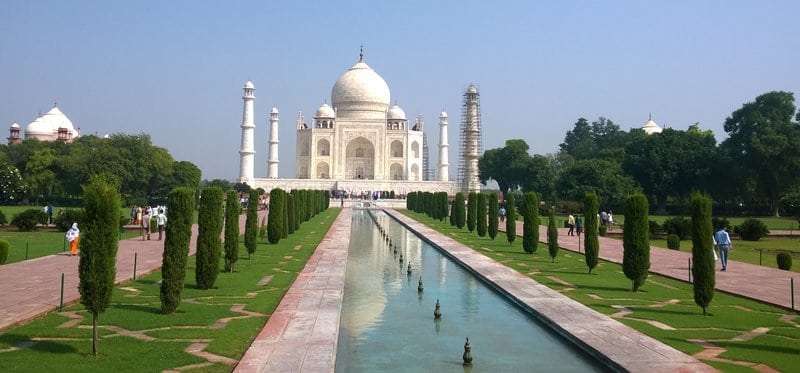India’s famed monument of love, the white marble Taj Mahal, is finding itself at the heart of a political storm, with some members of the country’s ruling Hindu right-wing party claiming that the mausoleum built by a Muslim emperor does not reflect Indian culture.
The most recent attack came recently when Sangeet Som, a lawmaker from the Bharatiya Janata Party, called the 17th century monument “a blot on Indian culture” that was built by “traitors.”
But Som wasn’t the first to attack the mausoleum that Mughal Emperor Shah Jahan built in the northern city of Agra in memory of his favorite wife.
Last month, Yogi Adityanath, the controversial head monk of a famed Hindu temple who is now the top elected official of Uttar Pradesh state, where the Taj Mahal is located, said foreign dignitaries visiting his state should be gifted a copy of the Hindu religious book “Bhagvad Gita” instead of replicas of the Taj Mahal.
This isn’t the first time that India’s Islamic past has come under attack by members of the BJP or smaller Hindu groups.
The federal government, led by Prime Minister Narendra Modi, has also been accused of attempting to rewrite history textbooks, especially where India’s past Muslim medieval rulers are concerned.
In Uttar Pradesh, India’s most populous state, the state government even deleted the profile of the Taj Mahal from its official tourism booklet published earlier this month.
The brochure listed Hindu pilgrimage destinations such as Gorakhnath Temple in Gorakhpur, which Adityanath heads, and also included plans for new attractions such as a tour of locations related to the Hindu mythological text Ramayana.
Emperor Shah Jahan had the Taj Mahal built between 1632 and 1654 for his favorite wife, Mumtaz Mahal, after her death. He also planned on being buried next to her, and the complex houses their graves and a mosque, as well as several other graves of lesser Mogul royalty.
The stunning monument is India’s biggest tourist draw, with about 3 million visiting every year.
The tourism business it drums up keeps some 200,000 people employed, and Agra’s economy moving.
Som, the lawmaker who called the Taj Mahal a “blot,” went on to address criticism that the government had kept the iconic monument out of its tourism brochure.
“Taj Mahal should have no place in Indian history, as it was built by traitors,” he said in the rabble-rousing style he’s known for at a rally in Meerut, a city 300 kilometers (186 miles) southwest of the Uttar Pradesh state capital, Lucknow.
“Mughal Emperor Shah Jahan wanted to wipe out Hindus. If these people are part of our history, then it is very sad and we will change this history,” Som said.
Som, who was inaugurating a statue of the eighth century Hindu king Anangpal Singh Tomar, went on to add, incorrectly, that Shah Jahan had killed his own father. In fact, it was Shah Jahan who was imprisoned and killed by his son Aurangzeb.
Som’s comments drew angry condemnation from Muslim leader and federal lawmaker Asaduddin Owaisi, who asked if the government would urge tourists not to visit the Taj Mahal and other monuments built by India’s former Muslim rulers.
Every year on India’s Independence Day, Prime Minister Modi hoists the Indian flag from the ramparts of the imposing Red Fort in New Delhi. The red sandstone fort and palace was also built by Shah Jahan, in 1639.
“He should stop that because that fort is also built by a traitor,” Owaisi said.
The BJP sought to distance itself from Som’s comments.
The party’s general secretary, Vijay Bahadur Pathak, said the Taj Mahal is part of Indian pride, and that “whatever Som said is his personal view. BJP has nothing to do with it.”
Many criticized Som’s comments on social media.
“Actually, you are the blot for saying such nonsense,” television journalist Barkha Dutt said on Twitter.
But others backed Som’s remarks.
“BJP’s top elites may shun Sangeet Som, but what he said is only logical and true,” tweeted Sonam Mahajan, whose right-wing views attract a huge following on Twitter. — AP
